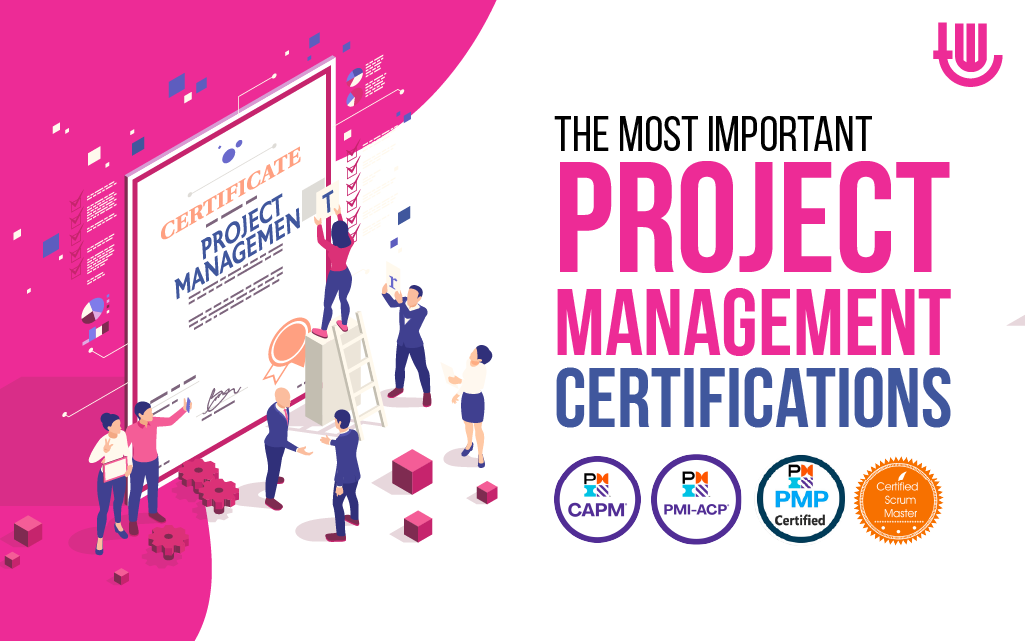There are various project management certifications which are crucial for an individual to become competent in the domain of projects and project management. Project Management certifications were initially developed by the Project Management Institute (PMI), which has now become synonymous with Project Management certifications in general. However, there are various other organizations that have developed their own certification programs in the recent past.
Certifications are an easy way to gain credibility and enhance your value. And, if you’re dealing with projects on a daily basis, they’re sure to grant you a competitive advantage. Project management certifications are one of the most important things you can add to your project manager resume. Here is a list of the most popular certifications and top-tier project management credentials, including: Project Management Professional (PMP), Project Management Institute’s Certified Associate in Project Management (CAPM), Scrum Master, and PMI-ACP. Here I am listing the best project management certifications to have, so be with me. You will definitely get a lot from this article.
The Most Important Project Management Certifications

Project management is a field of study that focuses on the planning, organizing, and managing of resources to achieve specific goals. Project managers are responsible for making sure their team meets any deadlines, goals, and targets set by the company. This means they need to work with their team members to make sure they are working together efficiently and effectively to meet those goals.
Project management certifications can be helpful when looking for work or moving up in your career path. Here are some of the most important project management certifications.
Project Management Professional (PMP) Certificate
The PMP certification is one of the most popular project management certifications worldwide. This certification was created by the Project Management Institute (PMI), an international non-profit organization based in the United States. To become a PMP certified professional, you must pass four exams that cover all aspects of project management, such as initiating, planning, executing, and controlling projects or programmes successfully; managing finances; ensuring quality; developing human resources; leading teams effectively; maintaining communication; and implementing change control processes efficiently.
To become a PMP, you need to pass the four-hour, 200-question exam. The exam is offered in English, Spanish, Portuguese, and Chinese. The exam covers five main domains: initiating, planning, executing, monitoring and controlling, and closing. To pass the exam, candidates must score at least 75% on each domain. The PMP credential has been around since 1996 and has over 350,000 active members worldwide.
CAPM (Certified Associate in Project Management) Certification
The CAPM® is a globally recognized standard for professional project management training and education based on PMI’s Project Management Body of Knowledge (PMBOK®). It is also recognized by many other international organizations as a benchmark for success in project management careers. CAPM (Certified Associate in Project Management) is an entry-level certification designed for those who want to start their PM career or add more value to their existing one by learning more about the tools and techniques used in the project management process. It consists of three exams: two core exams and one elective exam.
The CAPM certification covers all major aspects of project management, including creating and managing project plans; managing resources and risks; managing stakeholder expectations; controlling schedules and budgets; performing quality assurance activities; developing human resource plans; and handling communications with stakeholders.
PMI-ACP Certification
PMI-ACP (PMI Agile Certified Practitioner) is an alternative to PMP, which focuses on agile project management and allows you to demonstrate your knowledge and skills in areas like Scrum and Kanban. The PMI-ACP® credential is one of the world’s most prestigious project management credentials. It demonstrates that you have the knowledge and skills needed to lead and direct projects, programs, or portfolios. All PMI-ACP® credential holders must pass an exam administered by a third-party testing organization.
The PMI-ACP certification exam has 120 multiple-choice questions and you are given just three hours to complete this test. You have to give evidence of 1 to 3 years of experience before applying for this exam, along with a secondary education or bachelor’s degree.
Scrum Master Certification
Scrum master certification is a professional certification that is given to those who are working in the field of project management. The certification helps in gaining knowledge about Scrum and other agile frameworks. It also helps in understanding how they can apply it in their daily work. The Scrum Alliance offers a Certified Scrum Master (CSM) certification exam that is accepted by most major employers around the world. The CSM exam tests knowledge of agile principles and practices using a multiple choice format with 90 questions in 60 minutes. There are no prerequisites for taking this exam; however, experience in an agile environment is recommended before taking the exam.
Conclusion
There are various project management certifications that can lead you to the way of success and give you a competitive edge. These certifications are now being accepted as a part of education across all industry segments. So, it is necessary for every professional to get certified in project management. These certifications bring us knowledge, experience and credibility. There is a wide range of project management online training platforms available like Green Project Consulting and many more. These platforms have latest and enough material to train and prepare you for the project management certifications exams.